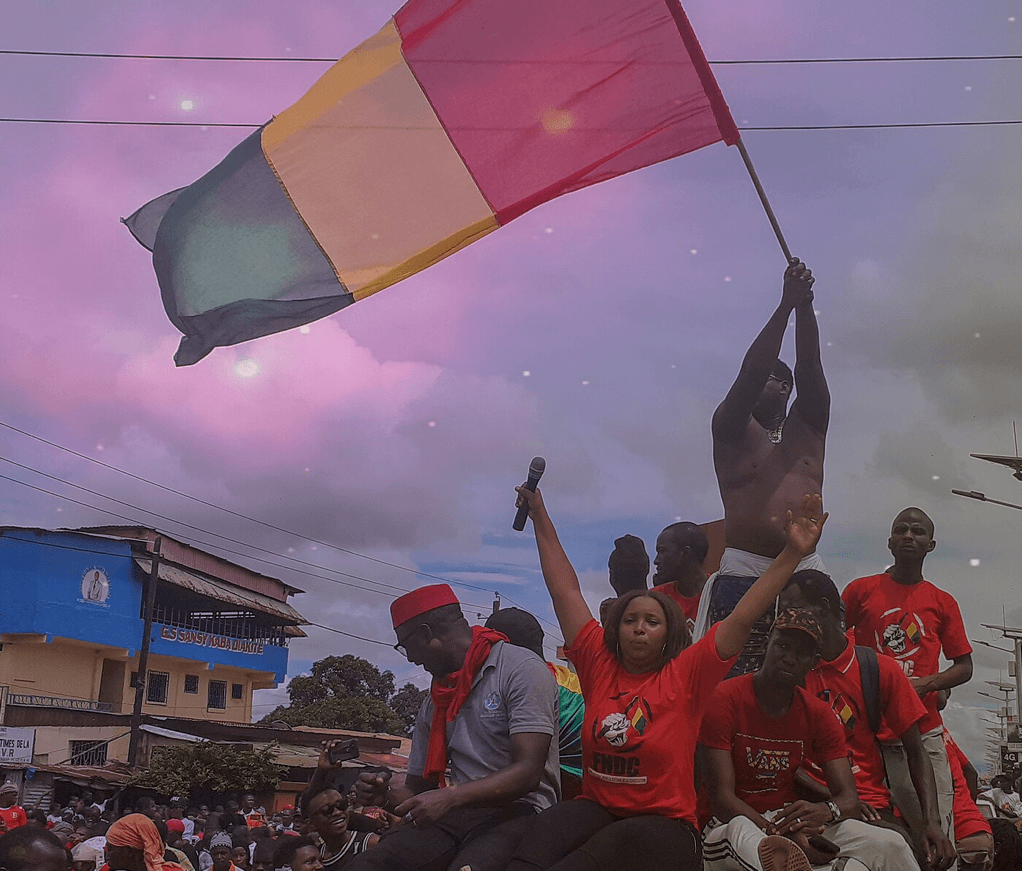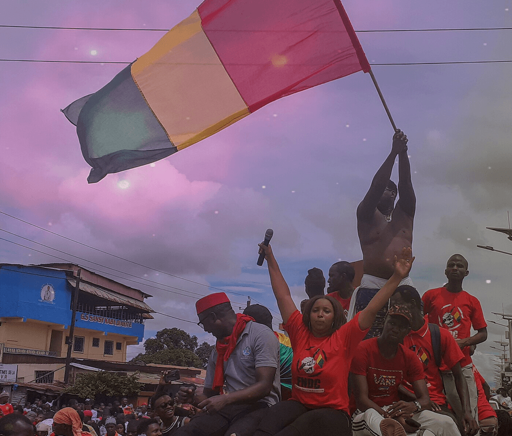
Demonstration on October 24, 2019, Conakry (Wikipedia Commons).
Following Guinea’s widely contested (and largely boycotted) constitutional referendum on September 21, 2025, Professor Mohamed Saliou Camara argues that the military junta has exploited the electoral process to establish authoritarian rule at the expense of social democracy.
In this exclusive interview for CounterPunch, Camara, Professor of History, Philosophy, and Journalism and Chair of the Department of African Studies at Howard University in Washington, DC, shares his analysis of Guinea’s political crisis. As an authority on Guinean political and social history, Dr. Camara is the author of several works such as, His Master’s Voice: Mass Communication and Single‑Party Politics in Guinea under Sékou Touré, Political History of Guinea since World War Two, and Health and Human Security in the Mano River Union. In his work, he also analyzes the country’s democratic transitions and derailments by the military junta under Colonel Mamady Doumbouya. Doumbouya promised a return to civilian rule but never delivered.
In this discussion, Camara delves into the junta’s suspension of oppositional political parties, independent electoral institutions, and the revision of the transition charter which basically amounts to allowing military figures to manipulate current and future elections. He summarizes the importance of civil society movements (youth-led) and heroic people like activists and journalists Foniké Mengué and Habib Marouane Camara. Their enforced disappearances in violation of international law symbolize the cost of resistance in today’s Guinean political climate.
Daniel Falcone: How do you explain the suspension of Guinea’s main opposition parties so close to the constitutional referendum and how does it compromise Guinean legitimacy?
Mohamed Saliou Camara: The only logical way the CNRD’s unilateral suspension of Guinea’s main opposition parties so close to the constitutional referendum can be explained is by considering it within the broader political climate of intimidation, cooptation, and exclusionary governance that the Doumbouya government has instituted with one thing in mind: having Mamady Doumbouya maintained in power through a highly undemocratic plebiscite.
In the past three years or so, Doumbouya and his CNRD have shown their true colors, turning the transition that they had pledged to lead in accordance with the will of the people and the common good of the country to a democratically elected leadership into a nationwide campaign of intimidation of democratic actors and civic leaders, many of whom have been silenced or forced into exile. Opposition leaders like Cellou Dalein Diallo of the UFDG, Sidya Touré of the UFR and, of course, former President Alpha Condé of the RPG are considered persona non grata while members of their parties are subjected to all kinds of political manipulation. Evidently, this unfolding climate of undemocratic governance does tarnish Guinea’s international image and, worse of all, it takes the country years back by undoing the political, economic, and sociocultural progress it has made against all odds.
The massive propaganda that the CNRD has been spreading notwithstanding, most Guineans are disappointed and worried, because when Doumbouya’s junta overthrew Alpha Condé and justified the coup by citing Condé’s falsification of the existing constitution to run for a third term, Guineans welcomed the change and were encouraged by Doumbouya’s pledge to return the country the constitutional order in a timely and democratic manner. Now, Guineans are disappointed by his betrayal of the people’s trust and expectations. Furthermore, they blame Alpha Condé for having made Doumbouya the powerful head of the newly created Special Forces and having provided him with the opportunity or excuse to orchestrate the September 2021 coup.
Daniel Falcone: What are the consequences of the newly created Directorate General of Elections (DGE) for “fairness and transparency” in the recent referendum? (This may impact the general elections upcoming in December).
Mohamed Saliou Camara: Just like the constitution being touted for a referendum, the DGE is customized to give legitimacy to Doumbouya’s desire and determination to stay in power against the pledge he made when he overthrew Alpha Condé. To be fair, though, the CENI (Independent Electoral National Commission) that it replaced also catered to the powers that be when it came to managing elections and tallying the results. For instance, the Guinean electorate is still baffled by the CENI’s decision to declare Condé winner of the second round of the 2010 presidential election over Cellou Dalein Diallo who had won the first round with 40% of the votes against Condé with only 18%. In fact, CENI’s bad reputation can be traced back to the Lansana Conté era.
Therefore, I would argue that keeping that agency or replacing it with a DGE makes little difference in the general context of what one may call Guinea’s non-democratic electoralism. We should not, however, lower the standards or our expectations, if for no other reason because two wrongs don’t make a right. Yet, we should point out that elections in Guinea have very rarely been transparent, free, and fair; regardless of what national officials or foreign observers say. We, who have experienced, witnessed, and been caught up in the whirlwind of Guinean politics, we know what it has been and why the current situation is a culmination of a long spiral.
Daniel Falcone: To what extent does the draft constitution impact the transition charter’s promise that junta leaders would not be eligible to run in future elections? It looks like political groundwork is being laid for Mamady Doumbouya to stay in power.
Mohamed Saliou Camara: The short answer to this question is that the draft constitution alters everything in the original transition Charter. In fact, and as indicated earlier, before the issuance of the Charter itself, Doumbouya had made a solemn pledge that neither he nor another member of his junta would be a candidate in the elections that will come at the end of the transition. Guineans, Africans, and the International Community gave that pledge the value and momentum that it should carry as the word of honor of a military officer to his nation. In the last three years, however, a massive campaign has been developed through comités de soutien that popped up across the country in highly corrupt circles to advocate for Doumbouya to be the candidate in the next presidential election.
Doumbouya’s CNRD has been distributing large amounts of money, cars, and similar gifts to people of all walks of life who are eager to create or adhere to such support committees and promote the “Oui” vote in the constitutional referendum. This is happening while Guinea’s Central Bank is running out of cash even to pay government employees. Where is that money and those cars coming from to fuel the rampant trend of political corruption? Many Guineans suspect that they are coming from the massive amounts of gold, bauxite, iron ore and similar mineral resources that foreign countries and industries are extracting from their country that remains impoverished despite its immense natural resources.
Daniel Falcone: What role are civil society actors and youth-led movements playing in the current moment and could you speak to the significance of figures like Foniké Mengué and Habib Marouane Camara in the pro-democracy struggle? I met organizers protesting by the UN that commented on the invisibility of their rights and human rights issues.
Mohamed Saliou Camara: Civil society actors, especially youth-led movements, rose against the CNRD’s campaign after it reneged its pledge to lead a legitimate transition and let the people choose democratically the country’s next leadership. They began to hold peaceful protests and town halls to mobilize, inform, sensitize, and guide civil society communities so they can decisively stand their ground and help preserve the legitimate rights and interests of the nation. This is exactly when the CNRD began showing its true colors by arresting, kidnapping, detaining, and killing leaders and members of these movements.
Such leaders as Fonikè Mengué and Habib Marouane Camara, whose fate remains unknown to this day, are henceforth heroes whose example many more are determined to follow, especially within the Guinean Diaspora. Despite what the protesters around the UN told you, Guinean Diaspora protests are more visible because the junta has unleashed a campaign of intolerance against anyone who challenges its intentions and dictatorial actions inside the country.
The post Guinea and the Challenges for Social Democracy and the Left appeared first on CounterPunch.org.
From CounterPunch.org via this RSS feed


